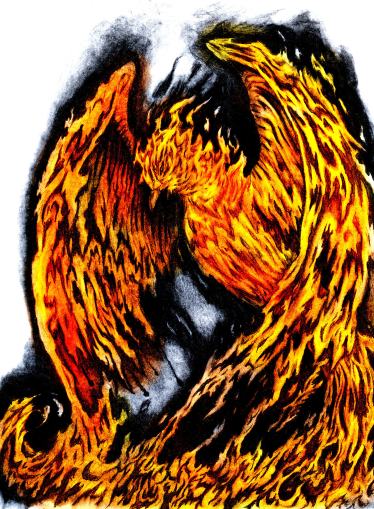
Magic and fantasy go hand in hand. Most fantasy stories have some sort of magic in them. Without it, the story would be nothing more than one in a medieval or similar setting. But what is magic? Basically, anything that causes the fantasy world to act differently than how we experience it here in reality. Here, we don't have people shooting lightning bolts from their hands, or summoning meteors, or animating brooms to clean up after you. Maybe in the future we can invent technology that lets us do that, but that would have to follow the laws of physics and would have a rational explanation. Magic doesn't have a rational explanation. Nor should it, in a way, but more on that later.
In some ways, magic can be a lot like superpowers. The main difference between fantasy and superhero genres are, besides the setting, the flexibility. Superheroes have set powers, and usually can't change them. Their powers are fairly limited, in comparison to magic. Even Superman, with all his might, has a set list of powers, mainly: flight, speed, strength, x-ray and laser vision, and super hearing. He doesn't, as far as I know, transform enemies into sheep and grow vines as a net to save Lois Lane from falling from the building for the fiftieth time, nor will he ever be able to. Magic, on the other hand, while different for each story, often lets its practioners learn from a wide variety of abilities. Sometimes spells are classed from the four elements, earth, water, fire, air, or from good and bad, or can be more spiritual. There are many ways of manifesting magic.
Often, who can use magic is a topic of great importance in fantasy. Usually, only certain people can. Sometimes, humans can't use it at all, only other races or creatures. Lord of the Rings is pretty much like this. The hobbits have no access to magic except through magical items. Really, only Gandalf has magic in the fellowship of the ring. Other books, only those born with magic can use it. Harry Potter is an example of this. Muggles will never learn magic, although sometimes they have children who can (Hermione). Others have everyone able to learn magic, to varying degrees. Not seen as often in books, in video games it is a little more common, especially RPGs and MMORPGs. In these, you usually choose a class which decides how much, if any, magic you can learn. Each fantasy world should be tailored to make sense with the system set up. Societies would usually revolve around magic users and their place within, whether as rulers, citizens, or outcasts.
Now, obviously magic needs a limit. If everyone has godlike powers, then it becomes meaningless. Even if only one person has such great power, it becomes meaningless. If the hero has power to wish the bad guys out of existence, then there is no story. If the bad guy can destroy the world with barely a thought, then there is no way to stop him. Usually, the antagonist of a story is more powerful than the heroes, to make him more of a challenge, but even he has limits. He might be sealed up in a prison or can only achieve his goals by sacrificing a princess of pure heart (and there aren't very many of those walking around). But there has to be limits, or the story is immediately boring and pointless. So often magic is developed into a system. There may be limits to how much you can handle (Wheel of Time), or how much you can use before becoming exhausted. There may be special ingredients needed to complete a spell, or difficult memorizations. Video games usually use MP (magic points) that are used up after each spell. Some might require great sacrifices. Others through music. There are many ways to set up systems of magic, and they can be precise systems where you know what makes something happen or they can be more fluid and less known what is powering them. Brandon Sanderson is a master of creating stories with well defined systems, and part of the fun of reading his books is figuring out how each system works. You can find out more on what he says on his blog.
It has been said that any technology advanced enough that people don't know how it works is like magic. If we take TV to a primitive people who has never been exposed to it, they might think it magic. This principle is especially true in science fiction, but many authors want to use it in fantasy as well. I personally don't like that so much, because if it can be fully explained, it ceases to be magic and starts to be science (or psuedoscience). Magic is all about wonder, about some power that can be accessed, but isn't fully understood, least of all by the audience. Fantasy, no matter how mature, should bring us back to childhood, where everything was magical: animals could think and speak in their own languages, brightly colored characters talked to you through the TV, monsters waited for you under your bed, Santa Claus gave you gifts and watched your every move, dragons flew through the clouds, stars winked at you and granted wishes, and mommy and daddy were superheroes.
So relive the magic and embrace your inner child. Because life would be too boring if we took it seriously.
Reblogged from http://sageeyesblog.wordpress.com/2013/01/20/magic/

No comments:
Post a Comment